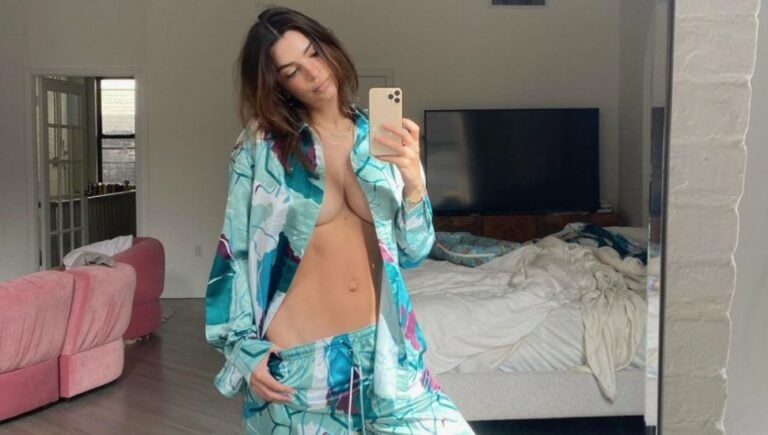Will we ever be able to truly make peace with Instagram? Will we ever be happy with our feeds and who we follow and what we see?
And if there’s so many complications with the platform, why does the vast majority of us either not give it up, or give it up only to come straight back?
While I must admit that I have all of the above thoughts on a regular basis, the ‘controversy’ surrounding Emily Ratajkowski’s recent Insta post via her Inamorata account really got me to thinking.
The photo in question was posted allegedly just 11 days after Ratajkowski gave birth to her first child. In the photo she’s seen flexing a super flat belly, which made a lot of people wonder how this was possible.
The post was and still has been received to mixed responses – there are those congratulating Ratajkowski on her ‘bounce back’ and others firing off at her for posting an image which by general standards ‘perpetuates unusual standards of beauty’.
While many headlines read words to the effect of, “Emily Ratajkowski slammed for ‘body positivity’ post”, it made me wonder, was she actually posting this photo in the interest of body positivity? Or did she just want to show off her miraculously flat stomach?
Love Music?
Get your daily dose of metal, rock, indie, pop, and everything else in between.
In a situation that seems rather simple on the surface, the reality is that it’s really not and it’s actually pretty nuanced. So after taking many factors into consideration, I had to remind myself of something particularly obvious to make sense of the situation: not everyone on Insta is here for the same purpose.
To elaborate, not everyone is on the platform to use it as a political tool, to be a part of inclusivity conversations or to preach their beliefs whatever they may be.
There are some of us that use it strictly as a political tool and some of us don’t use it for that purpose at all. Then there’s those of us who do a combination of both, consistently – or not so consistently. No one owes anyone anything on social media and body shaming is never okay. So why are people mad at Ratajowski?
After Ratajkowski posted the shot, actress Claire Holt took aim at her, saying, “If you post a picture of your completely flat stomach ten days after having a baby and call that body positivity, to me that’s the same as posting a picture of the millions of dollars in your bank account and calling that success positivity.”
Holt continued, “It might be true, but it makes other people feel shitty about themselves, and it’s not normal, and you’re an outlier, and you’re lucky. So maybe don’t show that part? Can we just use Instagram to try and make people feel included and not feel shit about themselves?”
Body confidence and anti-diet activist, Alex Light puts it this way. “Look, first off: I don’t think Em Rata owes anyone anything. And that’s the overarching message I’d love to convey around this picture, that has somehow caused a global controversy. She doesn’t owe us a ‘not perfect’ postnatal body, and she doesn’t owe us not showing her ‘perfect’ postnatal body.”
She continues to unpack her thoughts, ultimately concluding, “Do I also think what she shared is helpful to issues around post-pregnancy bodies and the pressures surrounding new mums? Not necessarily.”
“I think it’s important to account for the wider impact this picture will have and I do, unfortunately, think it will be negative. But, crucially, she never tried to be part of a conversation around post-pregnancy bodies – as @em_clarkson pointed out, all she did was… show up. This was projected onto her.“
It’s just like Cardi B never intended ‘WAP’ to be a feminist empowerment anthem. It’s just a song.
While in recent times the platform has definitely proven to have the makings of being a good educative tool on movements like body positivity and being a great springboard to start difficult conversations, I think we tend to forget that not everyone is on the platform to be a part of the ‘inclusivity conversations’.
In any case, there’s so much more to life than what we are fed on Instagram.


































